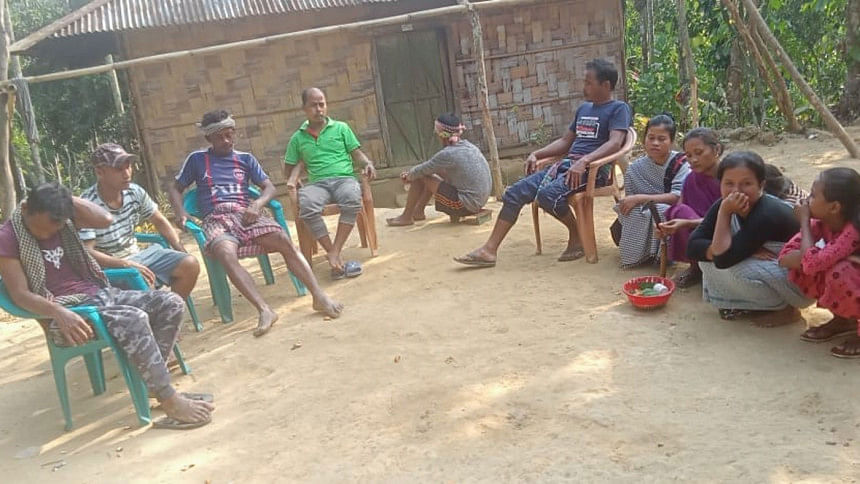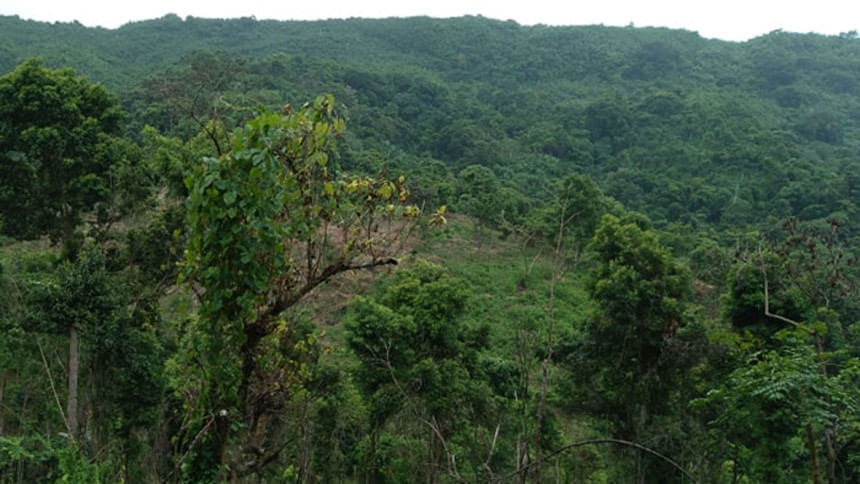No Christmas for them

Lobbing Sumer (40) is the head of a six-member family at Doluchhara punjee in Moulvibazar's Kulaura upazila. During the last 13 years serving as the Khasi punjee (indigenous village) chief, he had to manage the expenses of seven cases filed by the forest department against the members of their community.
"It takes around three to four years to settle each case. Three cases are still pending. I had to stop sending my two sons to school to meet the expenses. We have been left in a helpless situation," said Lobbing.
He mentioned that around 50 indigenous families are living in this punjee, who have been making a living by cultivating various forest fruits, including betel nut and betel leaf.
However, the forest department has filed 15 cases against these families on allegations of cutting trees and bamboo or theft.
Moreover, viral infection Utram destroyed most of the betel leaf production, followed by the flood.
One has to pay Tk 5,000 to 7,000 to appear in each hearing and some of us have to appear three to four times a month. Our kids want new dresses for Christmas. We cannot even get them that because we have to keep fighting the cases.
Prabin Nokrek, one of the accused in the cases, said, "Forest department officials tried to capture our only income source -- betel leaf gardens -- with the help of settlers in the name of social forestry project. We are not on the list of beneficiaries. Our land was being taken away from us but cases were also being filed against us."
Some members of the punjee also complained that false cases have been filed because they could not pay the money that was asked in return for not filing them.
Cruswell Rangsai (57) said he has been involved in four cases in the past seven years, two of which are still ongoing.
Cruswell is a father of nine children. Only two can go to school, while the rest have stopped due to the financial crisis.
"One has to pay Tk 5,000 to 7,000 to appear in each hearing and some of us have to appear three to four times a month. Our kids want new dresses for Christmas. We cannot even get them that because we have to keep fighting the cases," he said.
What's baffling is that the crisis erupted from an error that occurred during a survey.

Lawyer Abul Hasan, general secretary of Greater Sylhet Adivasi Protection Committee, said when the State Acquisition Survey started in the greater Sylhet region during the sixties, residents of various Khasi punjees were brought under record.
However, in the final record, all their land was recorded as government land. People of the Khasi community could not register them under their names due to a lack of awareness of the complicated process.
"From 2011 to this year, the forest department has filed 15 criminal cases against the residents of Doluchhara punjee. The Khasis have been acquitted in eight cases and seven are still ongoing. They have spent more than Tk 1 lakh on the cases in last November alone," said Abul Hasan.
When asked why the indigenous community was not given prioritised in the list of beneficiaries of the social forestry project, Beat Officer Arjun Kanti Dastidar said, "We have always told the indigenous people but they did not agree. These pieces of land are gazetted and registered by the government. The indigenous people have encroached on the land and filed title suits from time to time."
Muhibul Islam Azad, chairman of Karmadha Union, said the complaints of the indigenous community are not baseless. "The rules of social forestry are largely broken. In the list of beneficiaries, local influentials have indeed been named followed by irregularities," he said.
Kulaura UNO Mahmudur Rahman Khandokar said, "If the indigenous community has any complaint in this regard and files a written one to me, it will be properly investigated."
Kapeeng Foundation Coordinator Hiraman Helena Talang said, "Social forestry was started for the first time in 25 hectares of land in the 2010-11 fiscal year. Later in 2017-18 fiscal, 12 betel leaf gardens were taken over by the so-called rich beneficiaries in the name of social forestry. The indigenous people of the region were under threat ever since."
Mir Nahid Ahsan, deputy commissioner of Moulvibazar, said, "We have visited those punjees several times. There is a tendency to hurt the interests of ethnic minorities as they are considered weak. However, we have tried to stand by them under state sponsorship."

 For all latest news, follow The Daily Star's Google News channel.
For all latest news, follow The Daily Star's Google News channel. 








Comments